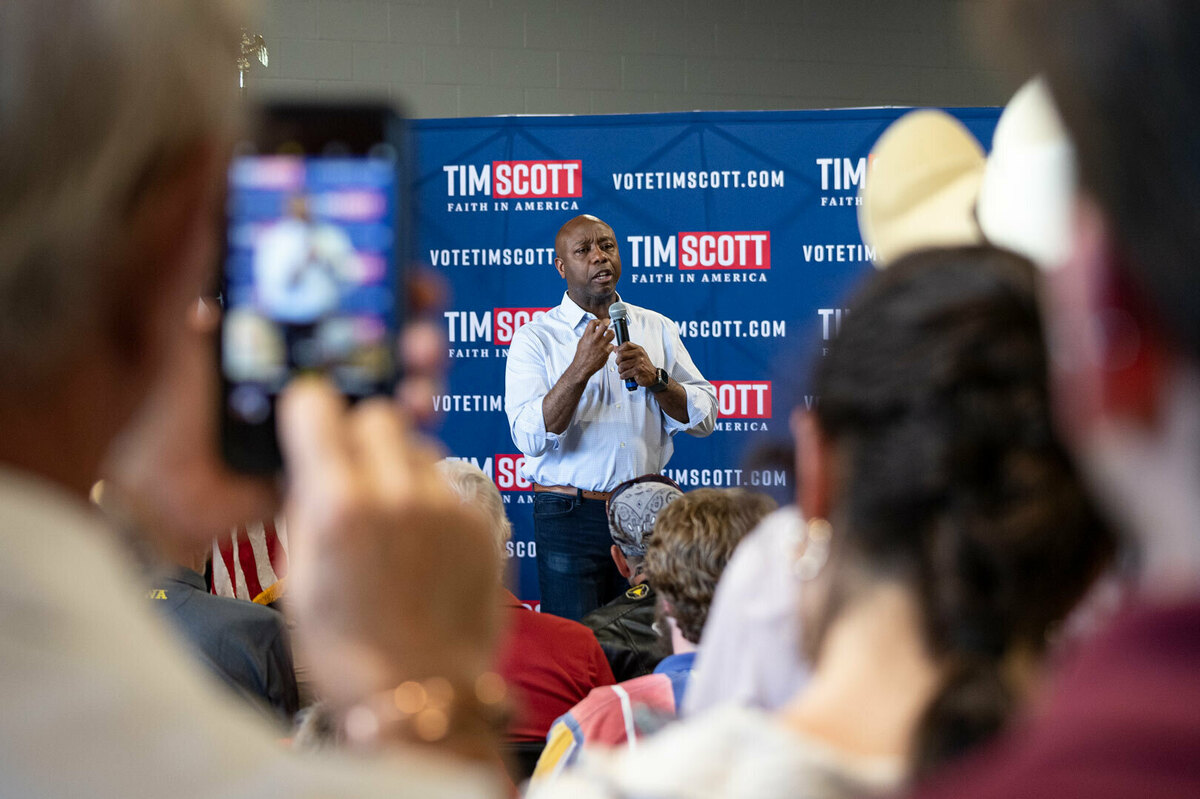South Carolina U.S. Sen. Tim Scott holds his first town hall as a declared Republican presidential candidate at Novelty Machine and Supply Co. in Sioux City, Iowa on May 24, 2023.
Clay Masters/Iowa Public Radio
hide caption
toggle caption
Clay Masters/Iowa Public Radio


South Carolina U.S. Sen. Tim Scott holds his first town hall as a declared Republican presidential candidate at Novelty Machine and Supply Co. in Sioux City, Iowa on May 24, 2023.
Clay Masters/Iowa Public Radio
At the same time Florida Gov. Ron DeSantis announced his run for president on Twitter, dozens of voters gathered at a Machine and Supply Company in Sioux City, Iowa. DeSantis isn’t the only politician to announce a White House bid this week and that’s why these voters are here to see South Carolina Sen. Tim Scott, another Republican presidential hopeful.
Retired music teacher Myra Nelson was hoping Scott would get into the race and was excited to see him in northwest Iowa holding his first town hall so soon after he’d announced.
“I was for Donald Trump but if he gets in, it’s just going to be the same thing,” Nelson said. “A lot of slander, a lot of bad news about him. We need someone fresh and someone with good, solid ideas.”
Scott didn’t bring up DeSantis or Trump as he gave a speech and took questions from the crowd. Instead, he talks about the southern U.S. border, the fentanyl crisis and tells his story about growing up poor in a single parent household. He boasted Iowa Governor Kim Reynolds’s bill she signed into law this year creating voucher-style education savings accounts for kids to go to private school.
Scott criticized Democrats on a number of issues, like education and public school funding.
“They’re more interested in keeping those kids trapped in their schools and trapped out of their futures,” Scott said. “They’re going to talk about the great opportunity party, give a brother a break!”
Scott was well received but he’s relatively unknown in a field where Donald Trump is the front-runner and enjoys widespread popularity with Republicans, especially in Iowa. Candidates like Sen. Scott, former UN Ambassador Nikki Haley and entrepreneur Vivek Ramaswamy, hope a win in Iowa could give them momentum to beat the former president who has only made one trip to the state since announcing his third bid.
After DeSantis’ announcement, he will make a three-state swing through early voting states with a specific focus on the first in the nation Republican caucus state. In previous appearances, DeSantis hinted at what a campaign speech will look like. He will likely draw comparisons between Florida and Iowa like he did earlier this month at a fundraiser for Iowa Rep. Randy Feenstra.
“You know, sometimes people will say to me… they’ll be like ‘Governor, why aren’t other Republicans doing what you’re doing in Florida?'” DeSantis told the crowd in Sioux Center, Iowa. “I say ‘I say they are doing it’ and they say ‘where?’ and I say ‘they’re doing it in Iowa!'”
The state’s importance is clear for those who support Trump and those who want to derail his candidacy. Special interest groups like the conservative Americans for Prosperity are beefing up staff to knock doors and make phone calls.
Drew Klein is the director of its Iowa chapter.
“There’s a lot to be thankful for among the GOP voters for policies that Trump helped implement when he was the president,” he explained about the group’s interest in new Republican leaders. “That doesn’t really do us any good if he can’t win a general election again.”
Voter and residential builder Kenan Davis favors DeSantis.
“I think there’s a very strong opportunity that he could win a lot of the voters that simply just have disdain towards Trump,” Davis said.
Davis’s wife, Cui Davis, a real estate agent, hasn’t made up her mind.
“For me, I’m still shopping around,” she said. “I want to hear all the candidates.”


Former Vice President Mike Pence speaks to Iowa voters at a backyard party in Des Moines, Iowa on May 23, 2023.
Clay Masters/Iowa Public Radio
hide caption
toggle caption
Clay Masters/Iowa Public Radio


Former Vice President Mike Pence speaks to Iowa voters at a backyard party in Des Moines, Iowa on May 23, 2023.
Clay Masters/Iowa Public Radio
The couple were invited to meet Mike Pence at a small backyard house party in Des Moines this week where the former Vice President chatted poolside and took photos with voters. Pence is expected to announce his bid early next month. As he wrapped up his speech, he told the crowd to take their job seriously as first-in-the-nation voters.
“Ask the hard questions. Shape the leadership,” Pence urged. “Whatever role my little family and I end up playing in the days ahead, I know Iowa’s going to give us a standard bearer.”
Republicans in this field can take some lessons from history. Even though Trump won Iowa in 2016 and 2020, he came in second in the caucuses when he first ran nearly eight years ago.
This story originally appeared on NPR





